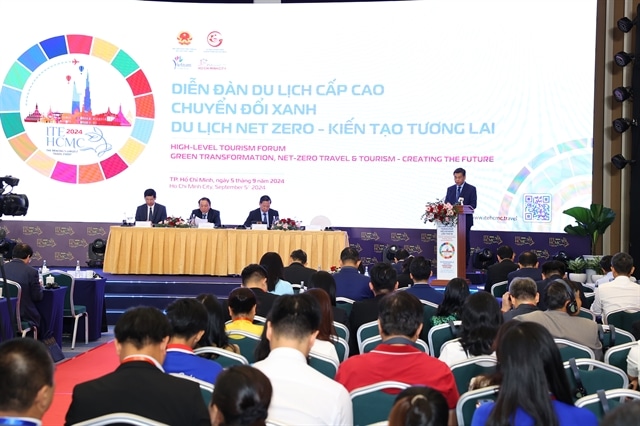
Green transformation in tourism is not an option but an inevitable strategic trend crucial for ensuring the industry’s sustainable development, a forum has heard.
Green transformation refers to the comprehensive shift towards sustainable practices to reduce environmental impacts, enhance resource efficiency and promote responsible tourism, Pavnesh Kumar, director of sustainability and research at the Pacific Asia Travel Association, said at the high-level “Green Transformation, Net-Zero Travel & Tourism- Creating Future” forum held in HCM City on Thursday.
The key aspects of green transformation in tourism include use of renewable energy, switching to the circular economy and emphasis on local cultures and community benefits, he said.
Major tourism destinations and companies are committing to net-zero targets by 2050, aligning with the Paris Agreement, he said.
There are various estimates of travel and tourism’s impact on carbon emissions, but a recent study puts it at 8 per cent of global carbon emissions, he said.
Destinations can differentiate themselves by promoting their commitment to sustainability and net-zero goals, he pointed out.
Destinations that integrate sustainability into their marketing could see up to a 20 per cent increase in visitor numbers driven by demand from eco-conscious travellers, he estimated.
“Green transformation and net-zero are not just trends but essential pillars for future-proofing the travel and tourism industry.
“Embracing these concepts in destination marketing will not only attract the conscious traveller but also contribute to global sustainability goals.”
Minister of Culture, Sports and Tourism Nguyễn Văn Hùng said green transformation represents the tourism sector’s commitment to minimising negative environmental impacts, efficiently utilising natural resources and preserving unique cultural and natural values.
The Government’s resolution on key tasks and solutions to accelerate recovery and usher in efficient, sustainable tourism affirms the role of sustainable tourism development in Việt Nam’s socio-economic development strategy and calls for green transformation in tourism, he said.
Cambodian Secretary of State of the Ministry of Tourism So Mara said the tourism industry, a powerful economic driver, is also a significant contributor to global carbon emissions.
“Given the importance of tourism for our economy and cultural preservation, the need to align with global net-zero targets is a matter of national responsibility.
“As policymakers, we need to do our best to foresee all potential developments and make necessary preparations to put in place strong and resilient measures to ensure sustainable development,” Mara said.
Lương Quang Huy, head of the greenhouse gas emissions reduction and ozone layer protection division at the Ministry of Natural Resources and Environment, said tourism, as a crucial economic sector, needs to make a commensurate contribution to the country’s low-emission development pathway by minimising greenhouse gas emissions at all stages.
He said the carbon footprint in the tourism industry needs to be identified so that appropriate policies and measures for reducing greenhouse gases could be developed.
The implementation of emission offsetting measures through reforestation in appropriate areas and support for reforestation projects is vital to move towards net-zero, he said.
Renewable energy for office activities, travel, camping, and transportation should be utilised and emission reduction measures such as conserving electricity and hot water, reducing consumption, recycling, and reuse should be adopted, he said.
Development of eco-tourism and sustainable tourism sites should be facilitated, he added.
(VNS)




